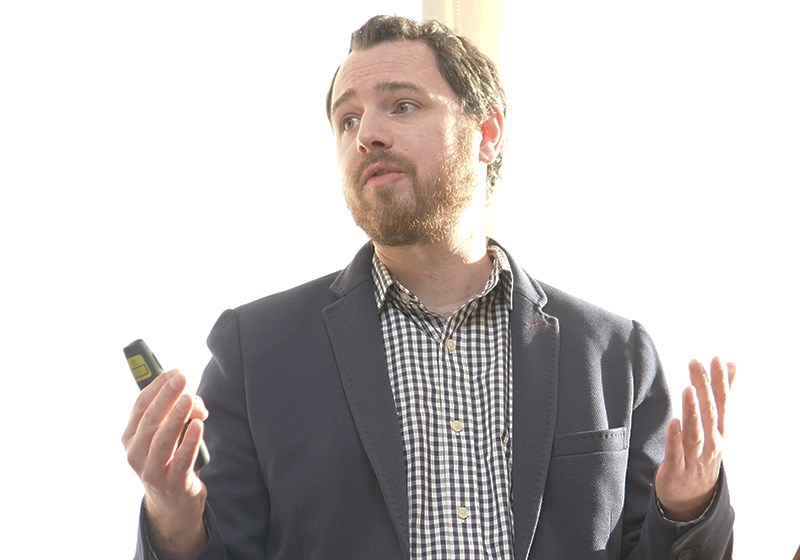City of Powell River councillors have received an update on the city’s overdose crisis.
At the committee of the whole meeting on Tuesday, February 18, Lift Community Services executive director Stuart Clark said he wanted to talk about the local context of the overdose crisis response.
“We just want to talk about how we are responding to the crisis and talk about some of our key services, including the overdose prevention site,” said Clark.
Vancouver Coastal Health (VCH) medical health officer Dr. Geoff McKee displayed a chart that shows the number of overdose deaths from illicit drug use in BC each year, going from 1993 to 2019. He said around 2016 there was a major spike in overdose deaths. It climbed to its highest point in 2017 and 2018, around 1,500 deaths each year at that time.
“This really highlights why a public health emergency was called throughout BC,” said McKee. “This is attributed to the introduction of fentanyl into the drug market and really underlies a lot of the response we’ve had.
“In 2016 the public health officer called a public health emergency, which led to a number of interventions throughout all the health authorities because it isn’t just a Vancouver issue. We’ve seen this across the province.”
McKee said that brings the issue to Powell River. He said when examining the numbers seen in 2017 to 2019, while the overall numbers are much smaller in a rural community such as Powell River, looking at the number of deaths due to illicit drug overdose by population, Powell River had about the second highest rate among health areas in the VCH region.
“It signifies that Powell River wasn’t immune to the overdose crisis we’ve seen provincially; comparing the population here, the rate was quite high,” said McKee. “At that time we started to investigate different approaches to try to address this issue here in Powell River. That’s where the Community Action Team funding came from, where a lot of the collaborative work the community had done was really coming together to find solutions to address this issue in the community.”
McKee said VCH’s approach includes harm reduction, which is preventing overdose deaths from happening. This includes items such as supervised consumption, overdose prevention and housing overdose prevention services.
Treatment is another core pillar, said McKee. The overall goal is to get people into treatment and moving on with their lives, he added.
The third component is strategies for supportive environments. These include changing the culture, making sure people feel supported throughout their journey to healthier lives.
McKee said a number of these approaches have been taken in Powell River, because the problem is not one thing.
“We need to address a number of different areas,” said McKee.
Clark said in response to the crisis, one of the flagship services was the creation of the first rural overdose prevention site outside of Vancouver.
“That’s got national media attention for being a new thing in a rural context,” said Clark.
He said there has been lots of education and outreach in Powell River. A team is training people in naloxone use and substance use, helping the community better understand what the issue is about and how to help, he added.
Clark said there is also the creation of Substance Users Society Teaching Advocacy Instead of Neglect (SUSTAIN). He said it is a peer-based group of people who have lived with the experience and are working to support other people who are using drugs.
“There’s a lot of incredible work in the community,” said Clark. “They are a big part of the Community Action Team and a big part of our organization in terms making the on-the-ground difference needed right now to keep people healthy, and in some cases, keep people alive.”
Clark outlined statistics on the overdose prevention site. Since it opened on June 20, 2019, there have been 569 visits to use drugs on site. There have been 251 visits to pick up supplies. Three overdoses have been reversed and there have been no overdose deaths on site.
Clark added that eight to 10 people per month are referred to the health service.
“We don’t track what happens after that but we can tell you that 10 more people a month are connecting to some health service in the community,” said Clark.
He added that the overdose prevention site is designed to be temporary. He said the City of Powell River had made it possible by making the land available at no cost so the site could be set up. The city would be asked to extend the lease, he added.
“I can say that VCH has stepped up to the plate and funded another year of operations,” said Clark. “I don’t think the crisis is going to be gone in the next year or two. The deaths last year did go down but overdoses did not go down. It’s a good sign that we’re responding better.”
McKee said positive trends are being seen provincially.
“It’s hard to say exactly why but we do have evidence showing many of the interventions we’ve taken provincially are having an effect.”
City councillor Rob Southcott said it was wonderful to see the death rate come down.



